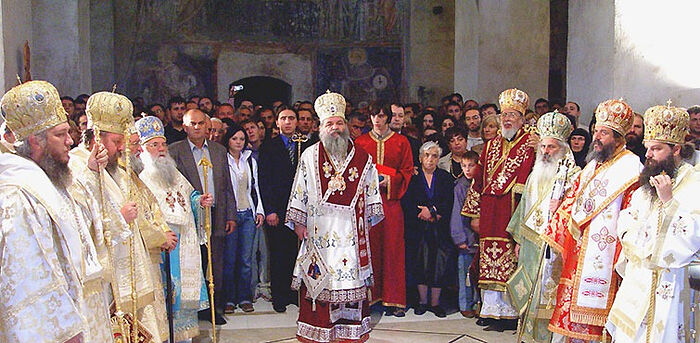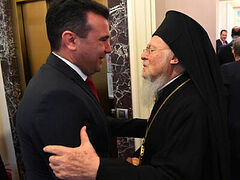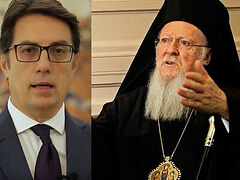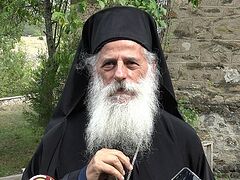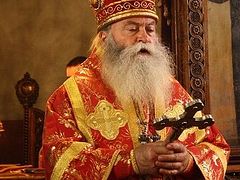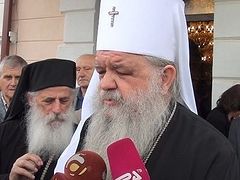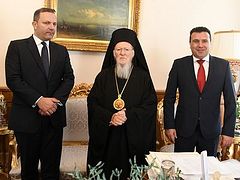Skopje, North Macedonia, December 29, 2020
With the Patriarchate of Constantinople’s invasion of Ukrainian Orthodox Church territory in 2018, the ecclesiological controversy that had been simmering in the Church for decades was forced to the foreground, resulting in schisms and divisions both between and within Local Churches.
While the schismatics who became the “Orthodox Church of Ukraine” accepted Constantinople’s more papist vision of itself and turned to the Patriarchate to take control of territory that was not theirs, to judge appeals from former hierarchs of another Church’s jurisdiction, to stage a council on territory that was not theirs, and to unilaterally create a new church on territory that was not theirs and grant it “autocephaly,” the canonical Ukrainian Orthodox Church under His Beatitude Metropolitan Onuphry of Kiev and All Ukraine adhered to the conciliar ecclesiological teaching of the Orthodox Church.
In much the same vein as the Ukrainian scenario, the “Macedonian Orthodox Church” (MOC) a schismatic breakaway from the Serbian Orthodox Church, and the North Macedonian government are also looking to Constantinople to grant it autocephaly. However, the ecclesiological division has reached there too, as not all hierarchs are in agreement about how to proceed—about which ecclesiological vision to embrace.
The Synod of the MOC has, however, thrown its weight behind Constantinople and its vision of unilateral actions within the Church.
On December 4, Metropolitan Grigorij of Kumanovo, the newest and perhaps most educated hierarch of the MOC, gave an interview to the Macedonian outlet Vecer in which he expressed views that were ultimately rejected by the Synod of the MOC.
In his view, the MOC “should approach the Patriarchate of Constantinople with great honor, but in an anti-authoritarian manner, emphasizing the legitimate and supreme function of an Ecumenical Council.” Moreover, Constantinople must recognize that what it holds is a coordinating role, while councils are guided by all Local Churches together.
Asked about the MOC’s appeal to Constantinople for autocephaly, Met. Grigorij denies such reports, insisting instead that it seeks only “mediation” from Constantinople. “There is no metropolitan, administrative or legislative body that would request a judicial review (appeal) of the autocephaly of the MOC-OA,” he says, because by appealing they would implicitly recognize that they have been in schism since 1967.
The MOC needs a mediation procedure, not a court procedure, Met. Grigorij believes.
Moreover, he does not believe that true autocephaly would come from Constantinople. All offers of “cooperation” that have come from the Bulgarian, Serbian, and Constantinople Churches, he states, are actually means of patriarchal domination over the MOC.
The MOC hierarch is completely against Constantinople’s Ukrainian model, where it restored and received hierarchs as though they had been schismatic, formed a council, elected a new metropolitan, and left its own exarch to function in Ukraine, and so on.
However, five days later, “Bishop” Parthenius of Antania gave an interview to the Ukrainian outlet Religia Pravda, in which he expressed views that are wholly in line with Constantinople’s vision, showing how much the MOC has put its hopes in Constantinople. The interview is also available in English on the site of Bigorski Monastery, of which Bp. Parthenius is the abbot.
Whereas Met. Grigorij denied that the MOC has appealed for autocephaly, the Religia Pravda interviewer states that both the North Macedonian state and the MOC have appealed to Constantinople, and Bp. Parthenius does not correct him.
According to him, only Constantinople has the right to hear appeals and grant tomoses, and Patriarch Bartholomew is well-disposed to the idea of granting the MOC autocephaly.
“Now we sincerely hope that the new Serbian Patriarch would act in the spirit of the evangelical love, and support the goodwill of the Ecumenical Patriarchate to grant our Church a tomos of autocephaly,” he says.
According to him, Constantinople always acts wisely and circumspectly, “as it did among, other things, with the Ukrainian issue.” Under the headship of Pat. Bartholomew, the Patriarchate of Constantinople is busily reestablishing its authority within the Church, Bp. Parthenius says.
Interestingly, he also claims that 2016’s Crete Council “confirmed the right of the Ecumenical Patriarch to grant a tomos of autocephaly and to be an arbiter in inter-Orthodox disputes.” However, the Council made no such decision, as the issue of autocephaly was not even on the agenda. Moreover, all agreed-upon pre-conciliar documents affirmed that autocephaly must be given in harmony with all Local Churches.
“The Ecumenical Patriarchate has always strictly adhered to true ecclesiology and canons,” Bp. Parthenius claims.
And faithfully reproducing Constantinople’s position, he emphasizes: “I think that the decisions of the Ecumenical Patriarchate regarding autocephaly should be respected by all, because otherwise the cohesion between the Local Orthodox Churches is disturbed and thus we come to different variations of Orthodoxy.”
And unlike the Ukrainian schismatics, the MOC hierarchs seem to be already prepared to accept a limited independence: “Autocephaly does not mean literal independence and self-sufficiency, but mutual dependence of the members in one Body of Christ.”
Members of Constantinople’s schismatic “Orthodox Church of Ukraine” have loudly criticized that Constantinople did not grant them true independence, as they expected.
In the end, the Synod of Bishops of the MOC sided with Bp. Parthenius, declaring that it places its hope in Constantinople.
In a statement from December 15, the Synod stated that it “distances itself and rejects the views of His Eminence Metropolitan Grigorij of Kumanovo and Osogovo… They represent his personal opinion and do not express the views of other members of the Synod.
“The Holy Synod of Bishops of the Macedonian Orthodox Church-Ohrid Archbishopric remains on its already-established position to talk with the Mother Church-Ecumenical Patriarchate regarding the resolution of the Church issue for its autocephalous status,” the hierarchs state.
In October, the Patriarchate of Constantinople said it is not currently considering giving autocephaly to the MOC, but rather, how to heal a schism. However, MOC hierarchs have repeatedly stated that they are in negotiations with Constantinople that leave them hopeful of receiving a tomos of autocephaly. Moreover, the Ukrainian situation has revealed that Pat. Bartholomew is not above radically changing his stance and going back on his word.
Follow us on Facebook, Twitter, Vkontakte, Telegram, WhatsApp, Parler, MeWe, and Gab!

